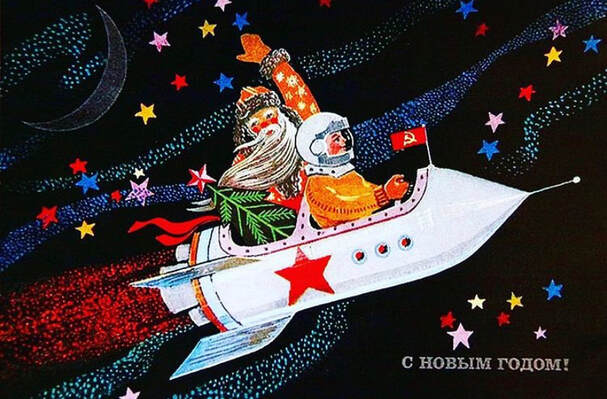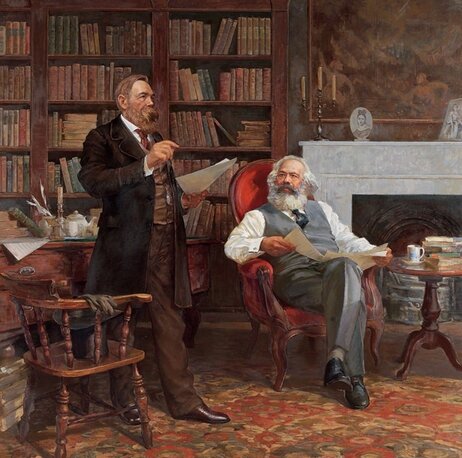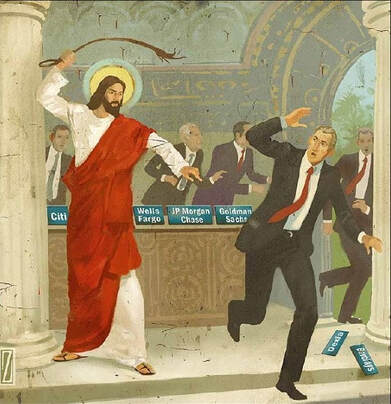|
12/25/2020 An Engels Christmas: Frederick Engels and Early Christianity. By: Thomas RigginsRead NowPart 1This is the season to remind all our Christian friends of the relationship between Christianity and Marxism-Leninism and the working class movement. Engels (“On the History of Early Christianity”) tells us that there are “notable points of resemblance” between the early working class movement and Christianity. First, both movements were made up of oppressed poor people from the lower ranks of society. Christianity was a religion of slaves and people without rights subjugated by the state and very similar to the types of poor oppressed working people that founded the earliest socialist and worker’s organizations in modern times. Second, both movements held out the hope of salvation and liberation from tyranny and oppression: one in the world to come, the other in this world. Third, both movements were (and in some places still are) attacked by the powers that be and were discriminated against, their members killed or imprisoned, despised, and treated as enemies of the status quo. Fourth, despite fierce persecution both movements grew and became more powerful. After three hundred years of struggle Christians took control of the Roman Empire and became a world religion. The worker’s movement is still struggling. After its first modern revolutionary appearance as a fully self conscious movement (1848) it achieved a major impetus in the later part of the nineteenth century with the growth of the First and Second Internationals, and the German Social Democratic movement. It too is now a world wide movement with Socialist, Social Democratic and Communist parties spread around the world. [The rise and fall of the USSR was a bump in the road the consequences of which have yet to be determined.] The Book of Acts reveals that the early Christians were primitive communists sharing their goods in common and leading a collective life style. This original form of Christianity was wiped out when the Roman Empire under Constantine imposed Christianity as the official religion of the state and set up the Catholic Church in order to make sure that the religious teachings of Jesus and the early followers of his movement would be perverted to protect the interests of the wealthy and the power of the state. With few exceptions, all forms of modern day Christianity are descended from this faux version, based on a mixture of Jewish religious elements and the practices of Greco-Roman paganism, and only the modern working class and progressive movements (basically secular) carry on in the spirit of egalitarianism and socialism of the founder of Christianity. Engels points out that there were many attempts in history (especially from the Middle Ages up to modern times) to reestablish the original communistic Christianity of Jesus and his early followers. These attempts manifested themselves as peasant uprisings through the middle ages which tried to overthrow feudal oppression and create a world based on the teaching of Jesus and his Apostles. These movements failed giving rise to the state sanctioned Christianity of modern times. Engels mentions some of these movements– i.e., the Bohemian Taborites led by Jan Zizka (“of glorious memory”) and the German Peasant War. These movements are now represented, Engels points out, by the working men communists since the 1830s. Engels reveals that misleadership is also a problem in these early movements (and still today I would add) due to the low levels of education found amongst the poor and oppressed. He quotes a contemporary witness, Lucian of Samosata (“the Voltaire of classic antiquity”). The Christians “despise all material goods without distinction and own them in common– doctrines which they have accepted in good faith, without demonstration or proof. And when a skillful impostor who knows how to make clever use of circumstances comes to them he can manage to get rich in a short time and laugh up his sleeve over these simpletons.” The Pat Robertsons and Jerry Falwell types have been around for a long time. I am sure readers can add a long list of names. Part 2Engels views on early Christianity were formed from his reading of what he considered “the only scientific basis” for such study, namely the new critical works by German scholars of religion. First were the works of the Tubingen School, including David Strauss (The Life of Jesus). This school has shown that 1) the Gospels are late writings based on now lost original sources from the time of Jesus and his followers; 2) only four of Paul’s letters are by him; 3) all miracles must be left out of account if you want a scientific view; 4) all contradictory presentations of the same events must also be rejected. This school then wants to preserve what it can of the history of early Christianity. By the way, this is essentially what Thomas Jefferson tried to do when he made his own version of the New Testament. A second school was based on the writings of Bruno Bauer. What Bauer did was to show that Christianity would have remained a Jewish sect if it had not, in the years after the death of its founder, mutated by contact with Greco-Roman paganism, into a new religion capable of becoming a world wide force. Bauer showed that Christianity, as we know it, did not come into the Roman world from the outside (“from Judea”) but that it was “that world’s own product.” Christianity owes as much to Zeus as to Yahweh. Engels maintains that The Book of Revelations is the only book in the New Testament that can be properly dated by means of its internal evidence. It can be dated to around 67-68 AD since the famous number 666, as the mark of the beast or the Antichrist, represents the name of the Emperor Nero according to the rules of numerology. Nero was overthrown in 68. This book, Engels says, is the best source of the views of the early Christians since it is much earlier than any of the Gospels, and may actually have been the work the apostle John (which the Gospel and letters bearing his name were not). In this book we will not find any of the views that characterize official Christianity as we have it from the time of the Emperor Constantine to the present day. It is purely a Jewish phenomenon in Revelations. There is no trinity as God has seven spirits (so the Holy Ghost is impossible Engels remarks). Jesus Christ is not God but his son, he is not even equal in status to his father. Nevertheless he has pretty high status, his followers are called his “slaves” by John. Jesus is “an emanation of God, existing from all eternity but subordinate to God” just as the seven spirits are. Moses is more or less “on an equal footing” with Jesus in the eyes of God. There is no mention of the later belief in original sin. John still thought of himself as a Jew, there is no idea at this time of “Christianity” as a new religion. In this period there were many end of times revelations in circulation both in the Semitic and in the Greco-Roman world. They all proclaimed that God was (or the Gods were) pissed off at humanity and had to be appeased by sacrifices. John’s revelation was unique because it proclaimed “by one great voluntary sacrifice of a mediator the sins of all times and all men were atoned for once and for all– in respect of the faithful.” Since all peoples and races could be saved this is what, according to Engels, “enabled Christianity to develop into a universal religion.” [Just as the concept of the workers of the world uniting to break their chains and build a world wide communist future makes Marxism-Leninism a universal philosophy.] In Heaven before the throne of God are 144,000 Jews (12,000 from each tribe). In the second rank of the saved are the non Jewish converts to John’s sect. Engels points out that neither the “dogma nor the morals” of later Christianity are to be found in this earliest of Christian expressions. Some Muslims would presumably not like this Heaven, not only are there no (female) virgins in it, there are no women whatsoever. In fact, the 144,000 Jews have never been “defiled” by contact with women! This is a men’s only club. Engels says that the book shows a spirit of “struggle”, of having to fight against the entire world and a willingness to do so. He says the Christians of today lack that spirit but that it survives in the working class movement. We must remember he was writing this in 1894. There were other sects of Christianity springing up at this time too. John’s sect eventually died out and the Christianity that won out was an amalgam of different groups who finally came together around the Council of Nicaea (325 AD). Those who did not sign on were themselves persecuted out of existence by the new Christian state. We can see the analogy to the early sects of socialists and communists, says Engels. We can also see what happened after the Russian Revolution (Leninists, Stalinists, Trotskyists, Bukharinites, Maoists, etc., etc.). Here in the US today we have the CPUSA, the SWP, Worker’s World, Revolutionary CP, Socialist Party, Sparticists, and etc., etc.). Engels thought that sectarianism was a thing of the past in the Socialist movement because the movement had matured and outgrown it. This, we now know, was a temporary state of affairs at the end of the 19th Century with the consolidation of the German SPD. The wide spread sectarianism of today suggests the worker’s movement is still in its infancy. Engels says this sectarianism is due to the confusion and backwardness of the thinking of the masses and the preponderate role that leaders play due to this backwardness. The Russian masses of 1917 and the Chinese of 1949 were a far different base than the German working class of the 1890s. “This confusion,” Engels writes,”is to be seen in the formation of numerous sects which fight against each other with at least the same zeal as against the common external enemy [China vs USSR, Stalin and Trotsky, Stalin and Tito, Vietnam vs China border war, Albania vs China and USSR. ad nauseam]. So it was with early Christianity, so it was in the beginning of the socialist movement [and still is, peace Engels!], no matter how much that worried the well-meaning worthies who preached unity where no unity was possible.” Finally, for those fans of the 60s sexual revolution, Engels says that many of the sects of early Christianity took the opposite view of John and actually promoted sexual freedom and free love as part of the new dispensation. They lost out. Engels says this sexual liberation was also found in the early socialist movement. He would not, I think, have approved of the excessive prudery of the Soviets. Part 3“Here is wisdom. Let him that hath understanding count the number of the beast: for it is the number of a man; and his number IS Six hundred threescore AND six.”– Revelation 13:18 In the last part of his essay Engels explains that the purpose of the Book of Revelations (by John of Patmos) was to communicate its religious vision to the seven churches of Asia Minor and to the larger sect of Jewish Christians that they represented. At this time, circa 69 AD, the entire Mediterranean world much of the of Near East and Western Europe were under the control of the Roman Empire. This was a multicultural empire made of hundreds of tribes, groups, cities and peoples. Within the empire was a vast underclass of workers, freedmen, slaves and peasants whose exploited labor was lived off of by a ruling class of landed aristocrats and merchants. In 69 AD the empire was in essence a military dictatorship controlled by the army and led by the Emperor (from the Latin word for “general”– imperator). At this time there were peoples but no nations in our sense of the word. “Nations became possible,” Engels says, “only through the downfall of Roman world domination.” The effects of which are still being felt in the Middle East and parts of Europe, especially eastern Europe. For the exploited masses of the Empire it was basically impossible to resist the military power of Rome. There were uprisings and slave revolts but they were always put down by the legions. This was the background for what became a great revolutionary movement of the poor and the exploited, a movement that became Christianity. The purpose of the movement was to escape from persecution, enslavement and exploitation. A solution was offered. “But” Engels remarks, “not in this world.” Another feature of the work is that it is a symbolical representation of contemporary first century politics and John thinks that Jesus’s second coming is near at hand. Jesus tells John, “Behold, I come quickly” three times (22:7, 22:12, 22:20). His failure to show up by now doesn’t seem to pose a problem for Christians. As far as the later Christian religion of love is concerned, Engels reports that you won’t find it in Revelation, at least as it regards the enemies of the Christians. There is no cheek turning going on here: it’s all fire and brimstone for the foes of Jesus. Engels says “undiluted revenge is preached.” God is even going to completely blot out Rome from the face of the earth. He changed his mind evidently as it is still a popular tourist destination and the pope has even set up shop there. As was pointed out earlier the God of John is Yahweh, there is no Trinity, it is He, not Christ, who will judge mankind and they will judged according to their works (no justification by faith here, sorry Luther), no doctrine of original sin, no baptism, and no Eucharist or Mass. Almost everyone of these later developments came from Roman and Greek, as well as Egyptian mystery religions. Zoroastrian elements from the Zend – Avesta are also present. These are the idea of Satan and the Devil as an evil force opposed to Yahweh, a great battle at the end of time between good and evil, [the final conflict] and the idea of a second coming. All these ideas were picked up by the Jews during their contact with the Persians before their return after the Babylonian captivity and transmitted to the early Christians. Once we realize all this we can also see why Islam was able to rise to the status of a world religion as well. Those areas of the world that were not the home land of Greco-Roman paganism were open to Islam which spread in areas of Semitic settlement and where Christianity had been imposed by force, so could Islam be. We will give Engels the last word, the Book of Revelation “shows without any dilution what Judaism, strongly influenced by Alexandria, contributed to Christianity. All that comes later is Western , Greco-Roman addition.” About the Author:
Thomas Riggins is a retired philosophy teacher (NYU, The New School of Social Research, among others) who received a PhD from the CUNY Graduate Center (1983). He has been active in the civil rights and peace movements since the 1960s when he was chairman of the Young People's Socialist League at Florida State University and also worked for CORE in voter registration in north Florida (Leon County). He has written for many online publications such as People's World and Political Affairs where he was an associate editor. He also served on the board of the Bertrand Russell Society and was president of the Corliss Lamont chapter in New York City of the American Humanist Association.
1 Comment
|
Details
Archives
July 2024
Categories
All
|



 RSS Feed
RSS Feed